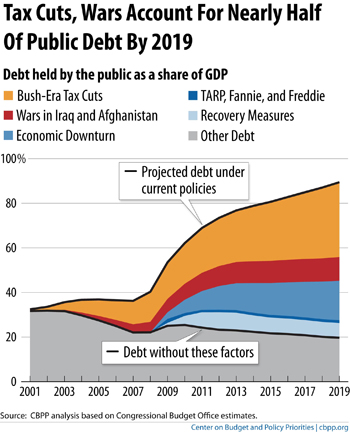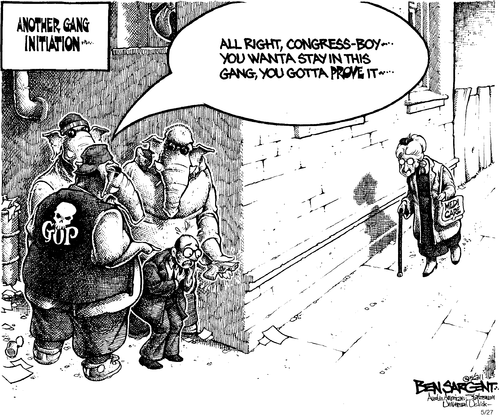What’s the difference between the debt and the deficit?
The federal debt is the cumulative effect of unresolved deficits over time. It currently amounts to about $14.3 trillion. The deficit is the gap between government income (i.e., taxes and other fees) and outflows in any given year. The current deficit is about $1.5 trillion dollars, higher than was anticipated last year thanks to the extension (again) of the Bush tax cuts (under threat by the GOP of a filibuster against extension of unemployment benefits) as part of the budget compromise at the beginning of 2011 between Obama and the GOP.
What’s the debt ceiling and why is it an issue now?
On May 16, the gross federal debt reached the limit allowed by law, the so-called debt ceiling. Unless Congress raises the debt ceiling, the U.S. government will default on its debts–for the first time in U.S. history. Many in the GOP are willing to force that to happen.
What would be the likely consequences of default?
- The government would be unable to pay interest to holders of government bonds. (That includes domestic and foreign holders of such bonds.)
- The credit rating of the U.S. government, which has always been AAA, would be downgraded.
- Credit markets would freeze, as they did in September and October 2008.
- As banks stopped lending, banks and businesses would do the same.
- Interest rates would rise sharply–for treasury bonds, corporate bonds and consumer loans.
- The stock markets would likely sink like a stone–not just in the U.S., but internationally.
- Since 40% of government spending depends on borrowing, federal spending–of every kind–including Social Security benefits, soldiers’ pay, etc.–would immediately drop by 40%, causing a huge shock to the economy.
- In short, there would be an economic crash in the U.S. and quite possibly, globally.
So it seems obvious that Congress should pass a bill raising the debt ceiling, right? Why is there controversy about that?
Although polls show the public is primarily concerned about jobs, there is widespread concern about the size of the deficit (currently about 10% of GDP) among the nation’s political elites. Concern about the deficit has been expressed repeatedly by politicians in Washington and elsewhere, and news stories about the deficit have been far more common than those about the unemployment situation.
Perhaps for that reason, the public strongly opposes raising the debt ceiling. (Whether any polling has been done on the extent of public knowledge of the issue, including the likely result of failing to raise the debt ceiling, is unknown to me at this time.)
The GOP insists unanimously that the deficit be addressed solely through spending cuts; no tax increases are acceptable to them. This despite the fact that (a) the Bush tax cuts, which were supported unanimously by the GOP, are responsible, along with the Medicare Part D unfunded mandate and Bush’s refusal to raise taxes to pay for the wars in Iraq and Afghanistan, for 33% of the deficit; and (b) contrary to GOP claims, tax cuts do not pay for themselves, as shown by Bush’s miserable record of job creation and GDP growth, despite enacting enormous tax cuts.
Despite the evidence and common logic, the Republicans in Congress insist that any vote to raise the debt ceiling must be accompanied by huge cuts in spending, excluding defense. At first, the GOP excluded Medicare, Medicaid and Social Security from cuts as well, but not any more, as Senate Minority Leader Mitch McConnell stated on Friday. In fact, many of the tea party Republicans in the House of Representatives argue that the debt ceiling should not be raised at all, regardless of the consequences. This is crazy. We could go a long way toward reducing the deficit simply by eliminating the Bush tax cuts, ending our involvement in Iraq and Afghanistan, and resuming stimulus spending to boost the economy.
Recently, the House GOP voted almost unanimously for Paul Ryan’s budget plan, which includes privatization of Medicare and changes to Medicaid that would make it unsustainable. The public reaction to that plan has been overwhelmingly negative and a Democrat, Kathy Hochul, recently won election to the House campaigning explicitly against it in an overwhelmingly Republican district. So essentially, the GOP is demanding that the Democrats in Congress cave in to their demands for drastic cuts to Medicare and other social programs under threat of default on our federal debt, the downgrading of our international credit rating, and a likely plunge into economic depression. What they can’t win at the ballot box they hope to win through extortion.
What you can do
Please join us in contacting your senators and representatives. Urge them to say no to the GOP’s extortion antics. The debt ceiling must be raised. There are rational ways to reduce the deficit and they must include repeal of the Bush tax cuts as well as spending cuts that do not hurt the most vulnerable among us, but those decisions must be made rationally–not haphazardly under threat.


